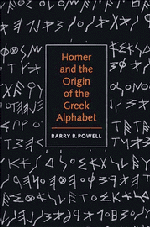Book contents
- Frontmatter
- Contents
- List of figures
- List of tables
- Acknowledgements
- Abbreviations
- A note on terms and phonetic transcriptions
- Chronological charts
- Maps
- Foreword: Why was the Greek alphabet invented?
- 1 Review of criticism: What we know about the origin Greek alphabet
- 2 Argument from the history of writing: How writing worked before the Greek alphabet
- 3 Argument from the material remains: Greek inscriptions from the beginning to c. 650 b.c.
- 4 Argument from coincidence: Dating Greece's earliest poet
- 5 Conclusions from probability: how the Iliad and Odyssey were written down
- APPENDIX I Gelb's theory of the syllabic nature of West Semitic writing
- APPENDIX II Homeric references in poets of the seventh century
- Definitions
- Bibliography
- Index
4 - Argument from coincidence: Dating Greece's earliest poet
Published online by Cambridge University Press: 01 June 2011
- Frontmatter
- Contents
- List of figures
- List of tables
- Acknowledgements
- Abbreviations
- A note on terms and phonetic transcriptions
- Chronological charts
- Maps
- Foreword: Why was the Greek alphabet invented?
- 1 Review of criticism: What we know about the origin Greek alphabet
- 2 Argument from the history of writing: How writing worked before the Greek alphabet
- 3 Argument from the material remains: Greek inscriptions from the beginning to c. 650 b.c.
- 4 Argument from coincidence: Dating Greece's earliest poet
- 5 Conclusions from probability: how the Iliad and Odyssey were written down
- APPENDIX I Gelb's theory of the syllabic nature of West Semitic writing
- APPENDIX II Homeric references in poets of the seventh century
- Definitions
- Bibliography
- Index
Summary
περί ʿΗσιόδου Τε ἡλικίας καὶ ʿΟμήρου πολυπραγμονήσανΤιἐς τὸ ἀκριβέσΤαΤον οὑ μοι γράφειν ἡδὺ ἦπισΤαμένωι Τὸ φιλαίΤιονἄλλων τε οὐΧ ἥκισΤα ὄσοι ΚαΤʾ ἐμὲ ἐπὶ ποίησει καθεσΤέκεσαν.
I have looked deeply into the question of Hesiod's date and Homer's, but it is no pleasure to me to write about it, being too aware of the extraordinary censoriousness of people in general, and most of all of those who have always opposed me in questions of poetry.
(Pausanias 9.30.3)If about 800 b.c. the adapter was inspired by an individual poet to make his invention, and if tradition has preserved the poet's name and works, that poet must have been either Homer or Hesiod. Only they are early enough to have played such a role. If the careers of either Homer or Hesiod coincided with the time of the alphabet's invention, it is plausible to conclude that it was Homer or Hesiod who inspired the adapter to his invention. Of course we can never attain certainty when attempting to reconstruct an event nearly three thousand years old for which there remains no direct documentary evidence; many who accept my argument so far may prefer to venture no further. Yet reflection, and evidence gathered from the study of oral poetries, has led me to oppose an agnostic position and to recommend that we consider in earnest the proposition that it was Homer or Hesiod who inspired the adapter.
- Type
- Chapter
- Information
- Homer and the Origin of the Greek Alphabet , pp. 187 - 220Publisher: Cambridge University PressPrint publication year: 1991



